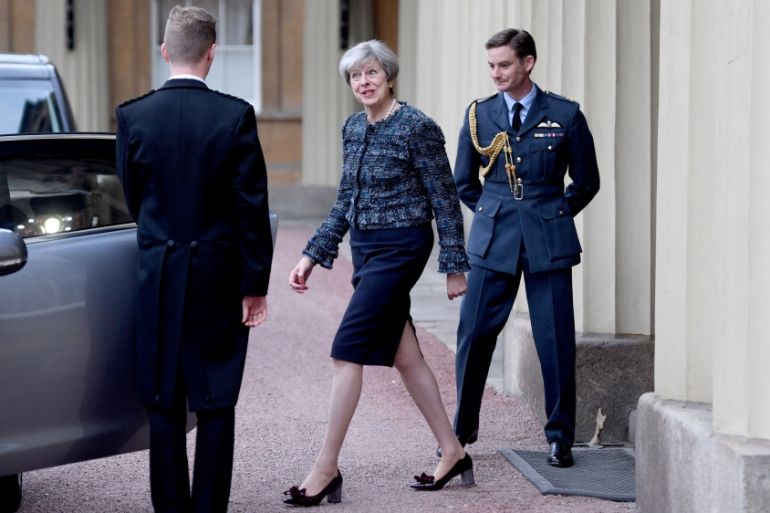Conservatives make strong gains in UK local elections
The results give the British Prime Minister Theresa May a boost before next month’s Brexit-dominated general election.

Theresa May‘s Conservative Party made strong gains in local elections in the UK on Friday, giving the British prime minister a boost in advance of next month’s Brexit-dominated general election.
After results were declared for some 2,000 council seats across England, Scotland and Wales by early afternoon, the Conservatives had gained 230 seats, while its biggest rival, Labour, had lost about 110.
Keep reading
list of 4 itemsUS House approves aid package worth billions for Ukraine, Israel
Will India’s election be free and fair?
Togo approves constitutional reform changing how president is elected
The Liberal Democrats, meanwhile, were down by nearly 30, while the UK Independence Party (UKIP) had lost all of the 41 seats it held in the previous elections.
If the trend continues, it could put the Conservatives on course to win dozens of parliamentary seats from its Labour in a snap general election on June 8.
READ MORE: Theresa May’s snap election – Smart, risky or cynical?
Turnout was low; dipping below 30 percent in some of the polls, which were held for 88 of Britain’s 418 local councils.
The Conservatives were careful not to overplay their expected victory next month, which could reshape the British political landscape for years to come.
“(They are) encouraging results. but I am cautious about predicating the general election on them,” Defence Minister Michael Fallon told BBC radio.
Labour also played down its losses. Finance spokesman John McDonnell described the results as tough, but “it hasn’t been the wipe out that some people predicted, or the polls predicted”, reported the Reuters news agency.
|
|
Al Jazeera’s Barnaby Phillips, reporting from Westminster, said it was striking that the Conservatives had made gains in Scotland, pushing Labour – once the dominant political force in Scotland – into third place, behind the Scottish National Party and the Conservatives.
Phillips said Labour would try to take comfort from the low turnout, expected to be doubled in a general election.
“People don’t necessarily choose the same options in local council elections that they will when it comes to electing their member of parliament,” said Phillips.
But he added that the opposition typically performs better in local elections: “So none of that augurs well for the Labour Party.”
Phillips said the scale of the eurosceptic UKIP’s losses were also striking.
“It seems that the Theresa May and the Conservative Party have consolidated their grip on the right wing of the British electorate, and they are very much the party that is trusted to deliver Brexit,” said Phillips.
UK-EU tensions
May succeeded David Cameron as prime minister last year. Cameron resigned following his failed campaign to keep Britain in the European Union in a June referendum.
May has asked voters to back her leadership of the country and her plans for negotiations with EU leaders.
European Commission President Jean-Claude Juncker took a swipe at Britain on Friday, saying he would not give a speech in English because the language was becoming less significant following Britain’s decision to leave the bloc.
“Slowly but surely, English is losing importance in Europe,” Juncker told a conference in Florence before switching into French and drawing applause from his audience of EU officials, local leaders and Italian students.
READ MORE: Brexit is still happening, just not the way May hoped
The conference on the state of the EU comes at a time of tensions between Brussels and London before formal negotiations over Britain’s withdrawal from the 28-nation bloc, or Brexit.
May earlier this week accused the EU of trying to influence the UK’s general election.
The prime minister’s comments followed leaked comments in the British and European press suggesting the EU thinks the UK is not being realistic about the conditions of its EU exit and the complexity of the negotiations ahead.
“If there is an increasingly confrontational attitude between Westminster and Brussels, the [local election] results today suggest that Theresa May is the political winner domestically of that process,” said Al Jazeera’s Phillips.
“One note of caution,” said Phillips. “There are four and a half weeks of campaigning still to go before the June 8 general election.”
|
|